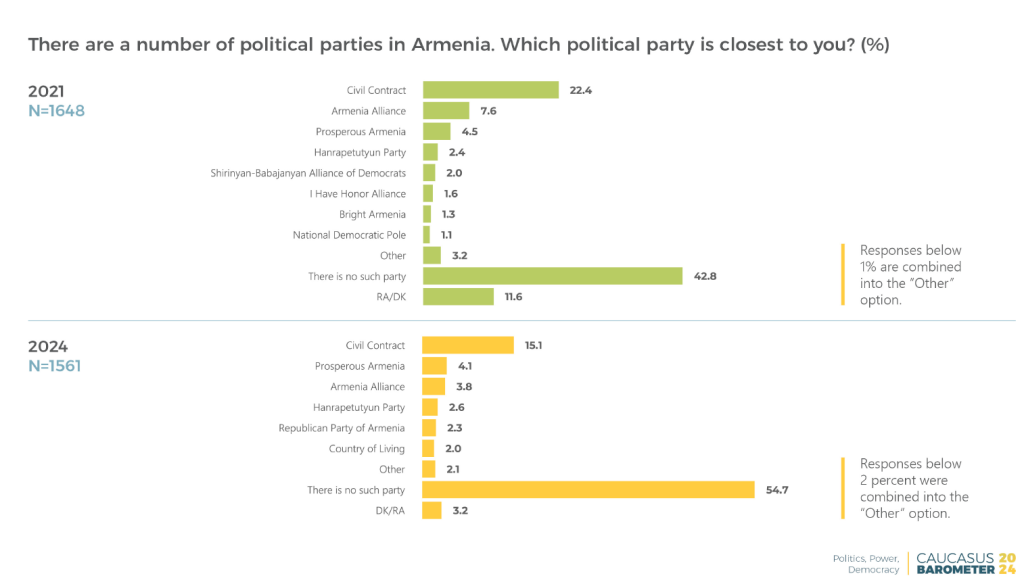By Alexander Pracht
Most Armenians do not feel represented by any political force, according to the latest Caucasus Barometer survey published on Wednesday. Additionally, public trust in state institutions and the press remains low: only a small fraction of respondents said they trust the government, and even fewer expressed confidence in the country’s media. The data is based on a nationwide household survey conducted by the Caucasus Research Resource Center (CRRC) in both rural and urban areas of Armenia, involving over 1,500 respondents between July and October last year.
Domestic issues
The results reveal a major void in the country’s electorate, with 54.7% of respondents saying there is no political party or movement they feel close to, up from 42.8% in the previous Caucasus Barometer, conducted in 2021. This growing disillusionment reflects not only disappointment in the ruling Civil Contract party but also a broader loss of faith in other political forces. Civil Contract, which has dominated the political scene following the 2018 revolution, saw its support fall from 22.4% in 2021 to just 15.1% in 2024. Despite this sharp decline, the party still leads by a wide margin: the eurosceptic and conservative Prosperous Armenia party trails far behind with only 4.1% backing, while other parties registered even lower levels of support.

This widespread lack of political affiliation does not mean Armenians have disengaged from politics. According to the survey, 63% of respondents said they are at least somewhat interested in domestic political developments.

Television remains the dominant source of information, with 60.5% listing it as their primary or secondary source of news, well ahead of social media, which was cited by 41.7%. Among social media platforms, Facebook continues to lead, used regularly by 27.5% of the population, followed by YouTube at 25.2%.
However, the survey also highlighted alarmingly low levels of political literacy and civic engagement. A striking 70.2% of respondents agreed with the statement, “People are like children, the government should take care of them like a parent.” Meanwhile, 83% said politics and governance seem so complicated that they can’t really understand what’s going on. Nearly half, 43.7%, believe their vote makes no difference, and other forms of democratic participation are even rarer: only 9% said they took part in a demonstration in the past year, and just 6.7% reported contacting a person in power.

Trust in law enforcement and the judiciary remains low across the country. Only 40.5% of respondents said they trust the police, and just 20.7% expressed trust in the courts. A large majority, 70.6%, believe that the judiciary favors certain citizens over others. While 74% say they trust the military, this confidence does not translate into active support: military officials continue to report a shortage of conscripts each year, and draft evasion through bribes and other means remains a common problem.

Despite widespread apathy toward political parties and institutions, many Armenians still view the country’s democratic development in a positive light. According to the survey, 75.8% believe people in Armenia have the right to openly express their opinions. Roughly the same share also said they consider Armenia a democracy. However, slightly more than half of them acknowledged that the country faces serious challenges to its democratic development.

Foreign policy and war
Recent political developments around Armenia’s potential path toward joining the European Union appear to have shifted public attitudes, making them less neutral than in 2021. Support for EU membership has risen to 44%, up from 37.4% three years ago. At the same time, opposition to the idea has also grown from 16.1% to 26.5%. The rest of the population remains either undecided or uninterested in the issue.
Support for the Russian-led Eurasian Economic Union (EEU) has also declined sharply. While only 14% of Armenians held a negative view of the bloc in 2021, the 2024 survey shows that 32.4% now say they do not support it at all, with an additional 11.5% expressing mostly negative views. Although the EEU facilitates a shared market and labor regulations, allowing Armenian migrants to work in Russia without a permit, experts argue it hinders Armenia’s deeper integration with the EU and restricts access to Western imports. The bloc’s growing role in enabling the parallel import of sanctioned goods into Russia has also emerged as a significant challenge.
When asked which country they consider Armenia’s main friend, the largest share of respondents, 37%, named France. In stark contrast, only 14% pointed to Russia, a dramatic decline from 83% in 2013. The sharp drop reflects deepening tensions between the nations, particularly following Russia’s inaction during the 2023 ethnic cleansing in Nagorno-Karabakh, its failure to provide allied support during Azerbaijan’s 2022 incursion into Armenian territory, and its refusal to deliver pre-paid weapons after launching its invasion of Ukraine in early 2022.
Lack of peace is now seen as Armenia’s most pressing challenge by 44% of respondents, up sharply from just 7% in 2019, before the Second Karabakh War. Unsurprisingly, Azerbaijan is viewed as Armenia’s main enemy by 56% of those surveyed, followed by Turkey with 28%. Despite overwhelming support for peace, with 88.5% in favor of reaching a settlement with Azerbaijan, public sentiment remains grim: three in four believe another large-scale war is likely, with 28% expecting it within a year and a similar share within the next four years.

When asked how peace could be achieved, respondents pointed to options such as signing a comprehensive treaty with Baku and maintaining a strong national army. Just 1.5% said they believe peace would come through a victorious war for Armenia, effectively dismissing Baku’s claims of widespread revanchism in the country.
The post Support of ruling party declines as more Armenians feel unrepresented, survey shows appeared first on CIVILNET.